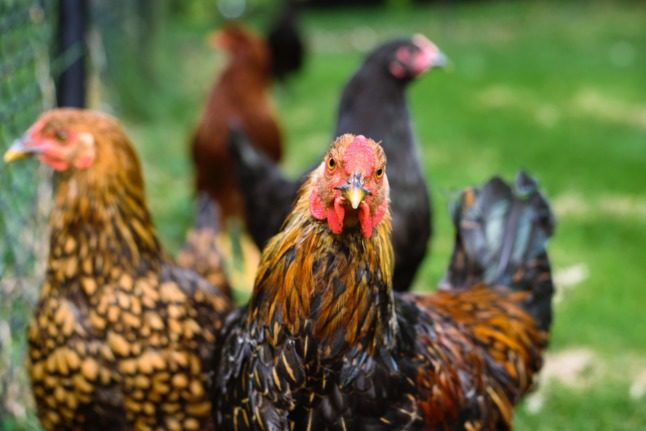Judging by the kind of issues that Swiss courts have had to rule on, it would seem that some people don’t have much else to occupy themselves other than nitpick and go looking for trouble.
Maybe it’s boredom or perhaps a genuine desire to see that justice is served, but some of the cases the legal system has had to consider (in all seriousness) are, well, you be the judge!
Gnome’s buttocks have a day in court
There are apparently no other problems in Fricktal, Aargau because the biggest news coming out of the rural area in the north of the country is a court case involving a rude garden gnome.
As reported by Blick on November 13th, an elderly couple is suing their neighbour because she refuses to move her butt-naked garden gnome, whose uncovered posterior is facing directly the pensioners’ kitchen window.
“When I look north, I see an ass”, the indignant husband testified in a district court.
He added that he told the owner of the offensive creature multiple times to “remove the gnome, you idiot!”
READ MORE: Nine ways you might be annoying your neighbours (and not realising it) in Switzerland
For the prosecution — yes, the couple actually hired an attorney — the accused deliberately placed the buttocks in the couple’s field of vision, an accusation that the gnome owner vehemently denies.
As the plaintiffs consider the incident to be “an attack on their honour”, they request that the gnome owner be fined 1,050 francs.
The case is still underway, but the judgment day is near.
A very fishy case in Zurich
We swear we are not making it up: a Zurich lawyer went to court to represent the (posthumous) rights of a fish.
It all started in 2008 when Patrick Giger, a 34-year-old angler from the Swiss village of Horgen, fished out a 10-kg pike from Lake Zurich.
Due the pike’s weight, he had to roughly yank it for 10 minutes, but he finally succeeded, and that night he and his friends ate it.
A few months later, the state prosecutor for Zurich filed criminal charges against Giger for causing excessive suffering to the animal.
The pike was represented in court by animal advocate Antoine Goetschel. Giger was acquitted, though the case might have left a fishy taste in his mouth.
READ MORE: The ten strange laws in Switzerland you need to know
As a result of this case, however, the parliament passed a law in 2009 requiring all anglers in the country to take a course on humane methods of catching fish.
Meanwhile, Goetschel has become known as Switzerland’s foremost animal welfare lawyer and he spearheaded a referendum that would require each canton to appoint a special attorney to represent pets and farm animals in court in cases of alleged abuse.
In response, a group called “No to the Useless Animal Lawyers’ Initiative” had been set up to urge voters to turn down the proposal.
Ultimately, it was rejected by 70 percent of voters on March 7th, 2010, on the grounds that Switzerland’s animal protection laws are already strong enough.
In fact, it seems that a number of cases in Swiss courts involve animals. Like this one…
Locking horns over cow bells
In 2014, a farmer in the Zurich Oberland area was court-ordered to remove bells from his cows after his neighbours complained the chiming kept them awake.
The residents of a hamlet live in homes adjoining a pasture where the farmer keeps some of his 27 cows.
The conflict began around four years previously, when residents asked the farmer to take the bells off cows who had come from mountain pastures.
When he refused, the case landed in a district court, which ruled that any cow located within 200 metres of a house between 10pm and 7am should be de-belled.
However, the farmer refused, arguing that his cattle had on occasion escaped from the enclosure and bells helped him locate them again.
Finally, a a cantonal court upheld the earlier ruling, but the farmer vowed to take his case all the way to the federal court.
Stay tuned.

A noisy cow. Photo by Heiner from Pexels
READ MORE: Why are cows so important in Switzerland?
And speaking of bells…
Whether on cows or in churches, the bells can create quite a ruckus.
For instance, a Protestant church in Wädenswil, canton Zurich, rang its bells every 15 minutes, even through the night.
A couple living nearby complained they couldn’t sleep and asked the local court to weigh in on the issue. They backed their case with a scientific study carried out by the Federal Institute of Technology (ETH) in Zurich, which showed that noise of the bells reached 48 decibels when the windows were slightly ajar.
Levels of 40-45 decibels can be disruptive, the study said.
READ MORE: The nine most surprising questions on Switzerland’s citizenship exam
The court agreed with the couple, ruling that the bells should only be rung on the hour at night, rather than every 15 minutes.
However, in 2017, the Federal Court has ruled on appeal in favour of the church, allowing it to continue ringing its bells throughout the night.
Switzerland’s highest court overturned the ruling, arguing that less frequent bells at night made little difference to noise levels and that this ringing of church bells was a local tradition.
The issue of noise in the countryside crops up in Switzerland from time to time, which brings us to the case of…
The noisy henhouse
In 2010, a couple purchased a house in the hills over Montreux, Vaud, with the intention of keeping chickens on its 4,000m2 parcel of land. The commune confirmed that they could keep up to 2,000 chickens on their property.
But in 2012, a neighbour complained about the racket the chickens and roosters made in the vicinity of his house and demanded 97,000 francs in damages.

The noisemakers. Photo by Jordan Whitt on Unsplash
The owners claimed, not unreasonably, that this was an absurd demand in a rural area, especially as the neighbour didn’t live in his house full-time and only stayed there occasionally.
After months of legal wrangling, the neighbour agreed to renounce his claim for damages if the couple gave up their henhouse, which they refused to do.
The court finally ruled in favour of chicken owners, ordering the neighbour to pay more than 36,000 francs in court costs.
These are among Switzerland’s weirdest court cases, proving that the Swiss don’t hesitate to use the judicial system if they feel their (or their animals’) rights are being violated, even in ways that could be seen as trivial in some countries.
But that’s not all
Sometimes, strange things can happen before people even get to court.
In 2016, a man caught speeding drove to his court hearing in the canton of Lucerne in a car with stolen number plates.
The 25-year-old made it to court, but was re-arrested in a car park immediately following the hearing.
READ MORE: Five Swiss laws that foreign residents are bound to break



 Please whitelist us to continue reading.
Please whitelist us to continue reading.
Member comments